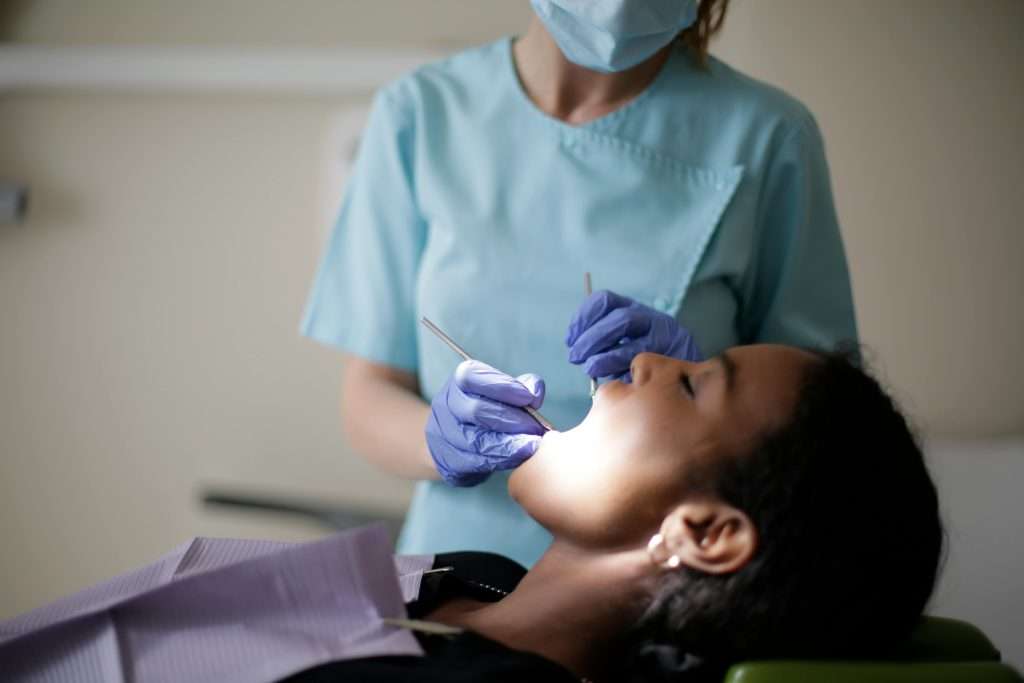Black triangle teeth, those elusive gaps between your teeth that seem to appear out of nowhere, can be a source of frustration for many. Understanding the reasons behind these gaps is crucial for both oral health and aesthetics. In this article, we’ll delve into the common causes of black triangle teeth, shedding light on why they occur and how you can address or prevent them.
Gum Recession as a Leading Factor
Let’s start with a significant contributor to black triangle teeth – gum recession. As gums recede, they expose more of the tooth’s surface, leading to the formation of gaps. Genetics, age, and poor oral hygiene are common culprits behind gum recession. While we can’t change our genetic makeup or halt the ageing process, maintaining excellent oral hygiene and regular dental check-ups can significantly reduce the risk of gum recession.
Tooth Shape and Black Triangle Formation
Believe it or not, the shape of your teeth plays a role in the appearance of black triangles. Some tooth shapes are more prone to developing gaps and spaces. The interplay between tooth anatomy and gum tissue determines whether black triangles will form. If you’re concerned about the shape of your teeth, discussing it with your dentist is a crucial step. They can offer insights into potential orthodontic solutions to address these concerns.
Dental Procedures and Their Role in Black Triangle Formation
Surprisingly, certain dental procedures may contribute to the emergence of black triangle teeth. Extractions, for instance, can alter the alignment of neighbouring teeth, leaving gaps behind. When undergoing dental treatments, it’s essential to communicate openly with your dentist about your aesthetic concerns. They can take preventive measures during procedures to minimise the risk of black triangle formation.
Lifestyle Habits and Their Impact on Black Triangle Teeth
Our daily habits can significantly influence the appearance of our teeth. Smoking, in particular, is a known culprit for both oral health issues and aesthetic concerns. The chemicals in tobacco can contribute to gum recession, exacerbating the likelihood of black triangle formation. Maintaining a healthy lifestyle, including giving up smoking, can go a long way in preserving the beauty of your smile.
Orthodontic Treatments and Black Triangle Risks
If you’ve undergone orthodontic treatments, you might wonder if they could be linked to black triangle teeth. In some cases, orthodontic procedures can contribute to gaps, especially if not properly managed. However, advancements in orthodontics now offer solutions to minimise these risks. When considering orthodontic treatments, discuss your aesthetic concerns with your orthodontist to ensure the best possible outcome.
Genetic Predisposition and Black Triangle Teeth
While we can’t choose our genes, understanding the role of genetics in black triangle formation is crucial. Some individuals are genetically predisposed to develop gaps between their teeth. If you have a family history of black triangle teeth, being proactive about preventive measures, such as regular dental check-ups, can help you maintain a healthy and aesthetically pleasing smile.
How to Prevent Black Triangle Teeth
It goes without saying that nobody wants to have black triangle teeth. It can rob you of your confidence, change the appearance of your smile, and it could lead to tooth loss. So, it’s in your best interest to take steps now to prevent getting this problem. Even small adjustments to your routine could make a huge difference. Here are some tips on how you can prevent black triangle teeth.
Maintain Good Oral Hygiene
First, you need to look after your teeth. You must brush twice a day, using a suitable toothpaste that contains fluoride. You should also ensure that you floss regularly. This prevents plaque from building up between the teeth and affecting your gums. While it can be easy to skip brushing when you’re tired, this is how you can develop bad habits.
It can also help to use mouthwash. This can assist in preventing plaque, as well as improving your breath. There are many on the market, but you can ask your dentist for some guidance if you’re confused on the best one.
Use a Soft Toothbrush
Do you have tough bristles on your toothbrush? Know that this could be causing unnecessary damage to your gums. Instead, you want to opt for soft versions, as this can help to avoid this damage.
Don’t forget that how you brush your teeth matters. If you’re being harsh and rough with your toothbrush, you’re going to damage your gums. This recession can play a part in black triangle teeth. Thus, ensure that you’re investing in a soft toothbrush and learning the right techniques.
Improve your Lifestyle
Are you a smoker? This is something that people will be pestering you to change. Well, it’s going to be no different here. It’s best to give up smoking due to the tobacco, which can increase your risk of gum disease. Consequently, it could be one of the causes of black triangle teeth in the future.
In addition, it always helps to improve your diet. In other words, ensure you’re getting the vitamins and minerals your body needs. This is going to be an indirect way to improve gum health and take care of strong teeth.
Conclusion
In conclusion, black triangle teeth may be a common concern, but by understanding the causes, you can take proactive steps to address or prevent them. Whether it’s maintaining good oral hygiene, discussing aesthetic concerns with your dentist, or considering orthodontic treatments, there are various approaches to preserving the beauty of your smile. Early detection and preventive measures are key, so don’t hesitate to consult with your dentist for personalised advice tailored to your unique situation.


